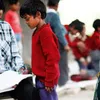Led by two Young India Fellows, this Mumbai-based organisation aims to transform early education
Founded by Jonathan Mendonca and Saumya Aggarwal, Barefoot Edu Foundation is working to transform educational spaces into stimulating learning environments that are contextualised for under-resourced communities.
Education, delivered the right way, can help the rainbow inside every child shine. But in India, often a child does not get access to the education and learning s/he deserves. As per the last census, 22 percent of India’s population lives under poverty, which often makes education a distant dream.
It was to address this concern that Jonathan Mendonca and Saumya Aggarwal, both Young India Fellows, started the Barefoot Edu Foundation. It is a social enterprise that works towards to ensure that children develop holistically across 5 domains: cognition, language and literacy, motor skills, socio emotional development and creativity.
The Mumabi-based foundation is a “grassroots organisation committed to transforming educational spaces into stimulating learning environments, contextualised for under-resourced communities”.
The founding duo believe that it is essential to empower children “with the relevant knowledge, skills, and platforms to make the most out of their education”.

Barefoot Edu Foundation Co Founders, Jonathan Mendonca and Saumya Aggarwal
The organisation, currently operational in Mumbai and Haryana, has revived early-stage education in around 10 low-fee private schools in Mumbai, and has trained 1,400 anganwadi workers in Karnal district of Haryana with the support of the state government.
From masons to their children
Speaking to SocialStory, Jonathan says, “I am a civil engineer by profession, and while working with a firm in Mumbai at a construction site, I realised that a lot of material was wasted as masons lacked basic knowledge of geometry. I taught them basic geometry. I remedied this by conducting trigonometry classes for them.”
It turned out well; masons learnt the right way to work and wastage of construction material dropped by a great margin. Impressed by Jonathan’s methods, the masons asked him to teach their children, most of who were in primary classes.
In 2015, when Jonathan visited the children of masons, he realised they lacked attention span. Many of them didn’t even know how to hold a pencil.
Jonathan believed he had found his calling: reforming the early-age education system. However, he didn’t know how to make a difference in the sector.

Team at Barefoot Edu Foundation
In 2016, Jonathan applied for the Young India Fellowship at Ashoka University, Haryana. Here, he met Saumya, who has a bachelor’s in business, and was keen to work in the field of education. The duo enrolled for the Experimental Learning Module where fellows would work on real-life projects from diverse sectors in collaboration with organisations.
“"You could either take projects provided by the university or design your own project to work on. I had the opportunity to work alongside Saumya on a project and realised that our inchoate vision was the same: to do something to enhance the education system. We designed our project titled Barefoot Edu and worked on it from Friday to Sunday," Jonathan says."
Bridging the learning gap
In 2016, the duo decided to float their project - Barefoot Edu Foundation. They began by teaching children from schools like Delhi Public School, Teach For India, and a few others. This was to understand the teaching methods across a spectrum of schools run by private, government, and NGOs.
Soon, they saw an impact: the attention span improved as they taught small children through fun activities and special curriculums. However, they felt it wasn’t enough as they didn’t have enough time, and in 2017 started working with teachers to share their learnings.

Project Sakhi, ECE Fellowship, Mumbai
Jonathan says, “The issue is quite serious. Children who enter Class 1 don’t have the skills to learn, which creates a huge learning gap within the classroom. For instance, while some children are figuring out what a pencil or a book is, there are others who are quite ahead of them and begin the process of learning academic content.”
According to Jonathan, this puts a dent in a child’s overall development. If the gap persists, children are not able to learn or grasp things in higher classes and eventually drop out, he adds.
We, as children, had the privilege of quality education, but people living in poverty where both the parents are working don’t have that privilege of access to quality education at home. Somethings as simple as not being able to distinguish left and right affects reading as one is expected to read from left to right.", Jonathan says
While finding ways to address the dilemma, the duo came across the term “Early Childhood Care and Education”.
Their research also revealed that the government-led anganwadi system is the largest provider of education in the world, as it caters to 30 million students. The issue here was that teachers didn’t go through a streamlined process to be made capable of teaching; often, they got only four days of training.
“"It's not that they didn't want to get trained. Early childhood education escaped the right to education act which resulted in a nation wide unregulated preschool system and untrained teachers," Jonathan says.
Making a change
The founding duo then went around Karnal district and asked NGOs and individuals to volunteer for their cause: training anganwadi teachers.
“The motive here was to show the state that teachers could be trained at very low cost, and that the process isn’t too complex,” Jonathan says.

Training session with Anganwadi Workers and Supervisors in Haryana
He and Saumya went to district administrations and described how they would take up the entire load of teaching the anganwadi teachers along with NGOs and volunteers.
Jonathan says, “We aimed to increase the focus on early childhood education, by informing teachers of the importance of development in children at an early age, and how it can be noticed and measured.”
Seeing their progress, the Haryana government allocated a specific budget for all districts in the state towards early childhood education.
Jonathan explains that the organisation's approach is three fold: First is capacity building, of existing teachers or community leaders who want to become teachers.
The second involved bringing about a change in the policy and administrative system. Jonathan shares that teachers wouldn’t give toys to children to play with, which was affecting development. “We found that anganwadi workers feared that they would be held accountable if any toys were broken and hence did not allow children to play with the toys. We urged the government to issue a letter informing them that they would not be held accountable for broken toys and soon the toys reached the hands of the children," he recalls.

The modified school playground
Third, the organisation provides better infrastructure by enhancing existing infrastructure at certain levels. For this, Barefoot Edu helps create an atmosphere that is conducive to learning, be it by painting the walls or installing learning resources like at One Star Public School (OSPS), where a playground doubles up as a learning lab, helping students understand Foucault’s Pendulum and pendulum experiments through swings.
Jonathan says, “The entire structure is designed on the Building As Learning Aid (BALA) principle. Under this concept, we painted the floor under the door in a protractor design. So when a student moves the door, s/he would know at which angle the door is opened and understand the concept of angles.”
To teach the concept of centrifugal force, the duo attached stones to the fans.
What’s in the future?
Barefoot Edu is now running two projects. Project Leher Fellowship, operational in Haryana, is being supported by the state government, which pays a stipend to all 15 fellows under this programme.
Under Project Sakhi, which was started in January 2019, team of four works with 20 community fellows and 10 low fee private schools.

Anganwadi workers braining storming on activities for the classroom
The team now has six members, including the two founders in Mumbai and Haryana. They have worked with volunteers, other NGOS and the support from the Haryana government. At present, both founders are Mother Teresa Fellows and are incubated at Edumentum and Wipro Applying Thought In Schools (WATIS).
Barefoot Edu now plans to set up an institute, focus on data-driven policies, and increase the team size. “This will help expand our community-based learning across India to enhance early childhood education,” Jonathan says.
(Edited by Teja Lele Desai)









